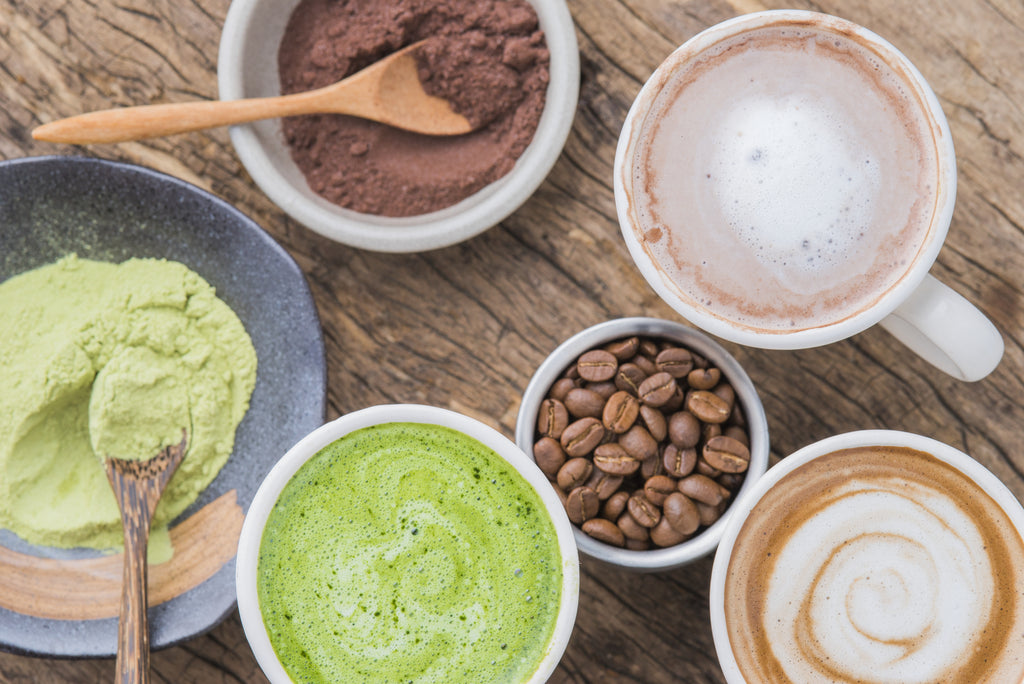
Matcha is an extraordinary drink. It not only tastes delicious but also provides amazing benefits. It’s refreshing to sit down with a cup of warm matcha (or a bottle of fresh, cold matcha) and relax.
We thought we’d take a look at how matcha compares to other popular drinks. Millions of people enjoy either tea, coffee, or espresso every day. So we pitted matcha up against these crowd favorites, and the results only underscored matcha’s greatness.
We believe in going the extra mile, whether that means organically sourcing our matcha or providing high-quality content to you. So we’ve given you the in-depth profiles on each of these drinks to show you the numbers and facts behind them. If you’re yearning to learn more about why matcha is so wonderful or want to see what’s at work in your morning beverage, you’ll find this little list to be useful and enlightening.
MATCHA
Taste: Vegetal, umami, sweet
Caffeine: About 65g–70mg of caffeine per 8 fl. oz. cup
Benefits:
- 137 times the antioxidants of a cup of green tea
- Provides L-theanine for an alert calm
- Can help fight off infections
- Increases blood flow in the cerebral cortex for improved focus
- Increases alpha activity in the brain, causing increased attention
Drawbacks:
- Doesn’t last long enough
- Regular consumer brands can be pricey
BREWED TEA
Taste: Varies; citrus, floral, and sweet are common tastes
Caffeine: 0g–70mg per 8 fl. oz. cup, depending on type (decaffeinated to black tea)
Benefits:
- Anti-inflammatory properties
- Good source of antioxidants
- Boosts endurance
Drawbacks:
- May inhibit absorption of iron
- May cause upset stomach
BREWED COFFEE
Taste: Varies; floral, chocolatey, and nutty are common tastes
Caffeine: 95g–200g per 8 fl. oz. cup, depending on type (varies by country of origin and other factors)
Benefits:
- Can reduce risk of developing certain cancers
- Can reduce risk of developing type 2 diabetes
- Good source of antioxidants
Drawbacks:
- Can cause jitteriness
- Can raise blood pressure and heart rate
ESPRESSO
Taste: Varies; can taste bright, chocolatey, citrus, etc.
Caffeine: 65mg–75mg per 8 fl. oz. cup
Benefits:
- Same benefits as coffee
Drawbacks:
- Same drawbacks as coffee
The Wonder of Matcha
To us, matcha is the perfect balance of taste and benefits. Its one-of-a-kind taste is delectable, and the calming L-theanine can work wonders on a tired, exhausted disposition. It’s the ideal companion to work, study, or relaxation.
Since matcha does contain roughly the same amount of caffeine as a cup of brewed coffee, we recommend you follow the same guidelines for consumption. It’s generally recommended that you drink no more than 4 cups of brewed coffee each day, so the same goes for matcha.
Keep in mind that a cup is 8 fl. oz.! A Starbucks Grande size is 16 fl. oz., so it’s two cups. When you’re consuming matcha, we recommend purchasing mugs that are 8 fl. oz. in size to keep track of your consumption. (As a plus, an 8 fl. oz. mug is a lovely, miniature-sized addition to your kitchen.)
Otherwise, enjoy your matcha. Enjoy the ritual and warmth that comes with brewing and drinking matcha, and don’t forget to replenish your wares.

